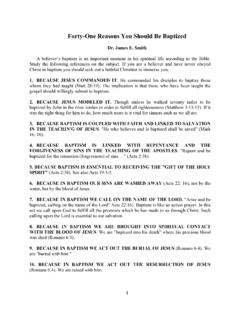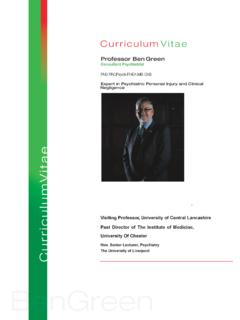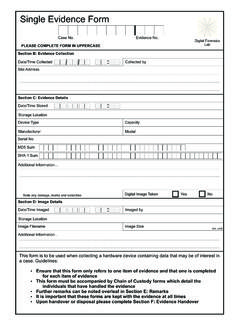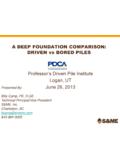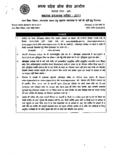Transcription of An Exegetical Commentary on Jeremiah - Bible Professor
1 An Exegetical Commentary on Jeremiah INTRODUCTION A Revision of Jeremiah and Lamentations " Bible Study Textbook Series" (Joplin: College Press: 1972). Copyright assigned to James E. Smith James E. Smith Florida Christian College 1011 Bill Beck Blvd. Kissimmee, FL 34744 2003 2 INTRODUCTION PART ONE: Jeremiah : MAN AND PROPHET The year 627 BC was a crucial one in the history of redemption. That was the year that God ordained a timid young priest to the prophetic ministry. Jeremiah was destined to become the dominant figure of redemptive history during that eventful half-century from 625-575 BC. What kind of man did God choose to vocalize the final divine appeal to the condemned nation of Judah?
2 How did God mold and shape the raw material that was Jeremiah of Anathoth? In the opening verse of Jeremiah the author clearly identifies himself, his family, his lineage and his hometown. This is about all that is known of Jeremiah before his call to the public office of a prophet. These few notices, however, can be amplified by deductions drawn from the totality of Jeremiah 's writings. What then can be said about Jeremiah the man? HIS NAME A great deal of importance was attached to names in the OT period much more importance than is generally the case today. Modern parents when naming the newborn usually think in terms of the length of the name or euphonious sound. The ancients, however, always considered the background and meaning of a name.
3 The name was to reflect the personality, the accomplishments, goals, or aspirations of a man. For this reason a man in antiquity might change his name at some critical juncture of his life. A. Meaning: Scholars are in general agreement concerning the meaning of important biblical names. No such unanimity exists when it comes to the name of Jeremiah . The basic problem is in ascertaining the Hebrew root word from which this name has been constructed. Some scholars think it is derived from see a Hebrew root (rum) which means to arise, elevate or exalt. According to this interpretation the name Jeremiah means the Lord exalts or exalted of the Lord or even the Lord establishes. Others suggest that the name is derived from the Hebrew root ramah that means to cast or hurl.
4 The name Jeremiah then means the Lord throws down or perhaps the Lord hurls B. Frequency: The famous prophet who is the subject of this study was not the only one to wear the name Jeremiah . Indeed the name seems to have been a common one. Evidence of its use can be found in several periods of OT history. At least seven other Jeremiahs are mentioned in Scripture. A Jeremiah was a leader in the tribe of Manasseh (1 Chron 5:24). Three of David's mighty 1 Still another interpretation of the name Jeremiah traces it back to an Assyrian root ramu meaning to loosen. The name would then mean the Lord loosens (the womb). 3 men bore this One of the fathers of the Rechabites was named Jeremiah (Jer 35:3).
5 A Jeremiah of Libnah was the maternal grandfather of Jehoahaz king of Judah (2 Kgs 23:31). One of the leaders of the restoration community who signed a covenant to walk according to the law of Moses was called Jeremiah (Neh 10:2). HIS FAMILY What kind of family did Jeremiah have? Was he surrounded in those early, formative years by piety and godliness? Caution is in order when one goes beyond the explicit testimony of Scripture and the Word of God does not supply any specific information about Jeremiah 's life in Anathoth. A. Godly Family: It is best to think of Jeremiah as coming from a very devout family. His family was one steeped in the religious traditions of Israel and committed unequivocally to the true God.
6 In his sermons Jeremiah reflects the spirit of the great prophets who preceded him. The words of these men of God were part of the fabric of his personality. He surely had been instructed in the Scriptures in his most tender years. Skinner writes: His familiarity with the ideas of the older prophets, especially with those of Hosea, appears so soon after his call, and that call came to him so early in life, that we may safely assume that he had known the prophetic writings and assimilated the principles of their teaching before he had reached the age of At the time of his call in 627 BC Jeremiah was still a very young man (1:6). He must have been born about the year of 645 BC, near the end of King Manasseh's long and notorious reign.
7 Perhaps the name of his father Hilkiah was more than a mere name; perhaps it was the family credo. The name Hilkiah means the Lord is my portion. During the reign of Manasseh, when apostasy was the order of the day and Assyrian idolatry was rampant through the land, this family had taken its stand. Though others were chasing after the latest fad in deities this family had boldly declared the Lord is my portion. Hilkiah, like Joshua before him, had proclaimed to the world as for me and my house, we shall serve the Lord (Josh 24:15). B. Influential Father: Is it mere coincidence that the high priest during the time of Josiah's reformation the one who discovered the lost law book bore the same name as Jeremiah 's father?
8 Is the father of Jeremiah the famous high priest Hilkiah? Scholars are practically unanimous in dismissing this identification. One cannot, of course, be dogmatic about the matter since the name Hilkiah seems to have been fairly common in this period (cf. Jer 29:3). If and it must necessarily remain just that if Jeremiah was the son of the high priest his ministry is placed in new perspective. One true prophet of God, Urijah, was executed during the reign of Jehoiakim (26:23-24). Though Jeremiah had some narrow escapes in the reign of this king, he survived. What 21 Chron 12:4, 10, 13. 3 John Skinner, Prophecy and Religion (Cambridge: University Press, 1963), 21. 4 made the difference?
9 Could it be because Jeremiah belonged to one of the most prominent families in the land? Jeremiah had friends in high He was treated with respect (for the most part) by the successive rulers of Judah and the princes of Babylon. While it is impossible to say with certainty that Hilkiah the high priest was in fact the father of Jeremiah , the thought is not impossible. As the son of a priest possibly the high priest Jeremiah no doubt frequently made the short trip to Jerusalem. There in the temple he had opportunity to observe, to ponder, to meditate and to contemplate the day when he would enter the active priesthood. Perhaps it was a high view of the priesthood, formed during his boyhood, which made Jeremiah so bitter against the worthless clergy of his adult years.
10 C. Financial Standing. A number of questions concerning the family of Jeremiah might be asked. It would be useless, however, to speculate about the answers. One point is at least probable: Jeremiah 's family must have been financially well off. This conclusion is based on the fact that Jeremiah was able to buy the forfeited estate of a bankrupt kinsman (32:1-15).5 It is hard to imagine Jeremiah receiving any wages for his prophetic ministry; his means must have come through inheritance. HIS HOMETOWN A. Priestly Community. Jeremiah grew up in the town of Anathoth located about three miles northeast of Jerusalem. This town dates to pre-Israelite times and was named by the original Canaanite inhabitants after their goddess Anath.
![[A Work in Progress] - Bible Professor](/cache/preview/e/e/3/3/2/d/c/f/thumb-ee332dcf388452f3fc2160af1dec50c3.jpg)
